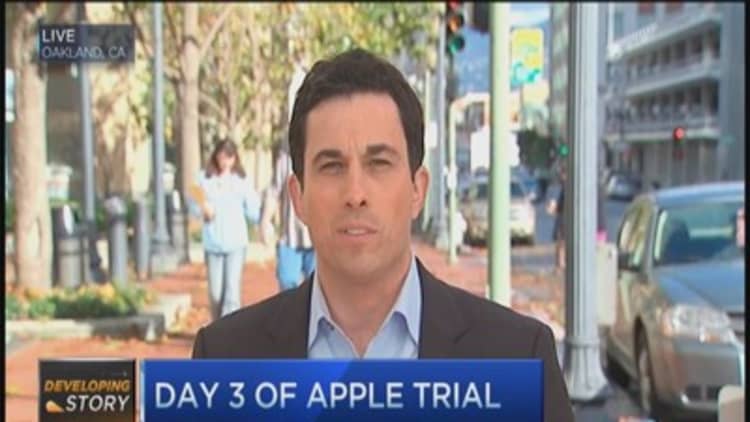Apple went on the offensive Wednesday with its own witnesses in the class-action antitrust trial in federal court in Oakland, California.
The jury will start to deliberate as early as next week whether Apple violated antitrust laws by blocking songs sold by rival digital music providers from working on iPods.
On Wednesday, Apple brought its first witness: John Kelly, a former University of California at Santa Barbara computer science professor, who has his own technology consulting firm.
Kelly was very well-versed in the innards of the Apple iTunes software iterations, and spoke directly to the jury about how Apple had to innovate its software code to keep up with music pirates and sophisticated hackers.
Read More Antitrust case against Apple on its last legs
Apple's lawyers are arguing that the updates to iTunes software eight years ago were designed to improve intellectual property protection from rampant piracy.
But the plaintiffs allege Apple discouraged competition, and they are seeking damages that could reach $1 billion.

At the core of the plaintiffs' case is the contention that Apple violated antitrust laws by changing its technology to block compatibility with RealNetworks competitive digital music software. However, no one from RealNetworks, including founder Rob Glaser, was called by the plaintiffs as witnesses.
By changing the iTunes software, the plaintiffs claim Apple effectively blocked consumers from playing music on their iPods that they may have downloaded from competitive music software providers, like RealNetworks's Harmony.
Read More Steve Jobs to take the stand in Apple antitrust suit
Kelly said Harmony's software went around Apple's encryption software and stripped out its digital rights management (DRM) system for downloaded music, replacing it with software that resembled Apple's software.
Then in September 2006, Apple came out with a revised version of its iTunes that disabled Harmony.
The plaintiffs claim Apple's changes to iTunes were designed to lock iPod customers into the iTunes, and thus, created leverage to charge consumers more for future iPod models.
Sources within Apple's legal team told CNBC it will call several more witnesses, and expect to rest by Tuesday. Federal Judge Yvonne Gonzalez Rogers is expected to rule on a still-to-be-filed motion that would make an iPod-using ice dancer the sole named plaintiff for the class action.
Read More Plaintiffs find possible witness in Apple antitrust case
Barbara Bennett is a former technology consultant who appeared this week in the court as a potential plaintiff in the class-action case. Bennett was flown by the plaintiffs side from Boston, after other named plaintiffs were dismissed.
From all indications, Bennett will be allowed to represent the plaintiffs case, but even if she is accepted by all sides, sources tell CNBC that she's already flown back to Boston without being called as a witness.
Apple is likely to continue with its second witness, University of Chicago economics professor Kevin Murphy on Thursday.
A massive storm is expected to arrive in Northern California on Thursday, and schools have already closed in Oakland, San Francisco and surrounding areas, but Gonzalez Rogers said court will be in session.
Correction: This version corrected the status of Barbara Bennett in the case.


